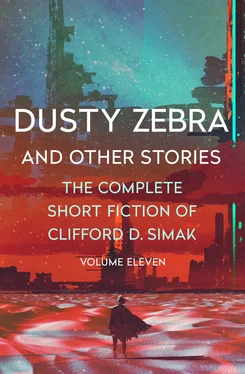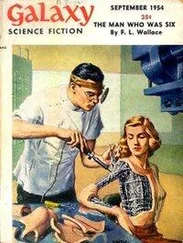“Yes, there is,” said Harrington. “I think you’d better leave.”
“Is there nothing I can do? Anything at all?”
“You’ve done quite enough,” said Harrington. “Quite enough, indeed.”
He sat down in the chair again, gripping its arms with his shaking hands, listening to the man go out.
When he heard the front door close, he called to Adams to come in.
“Is there something I can do for you?” asked Adams.
“Yes. You can tell me who I am.”
“Why, sir,” said Adams, plainly puzzled, “you’re Mr. Hollis Harrington.”
“Thank you, Adams,” said Harrington. “That’s who I thought I was!”
Dusk had fallen when he wheeled the car along the familiar street and drew up to the curb in front of the old, white-pillared house set well back from the front of wide, tree-shaded grounds.
He cut the engine and got out, standing for a moment to let the sense of the street soak into him—the correct and orderly, the aristocratic street, a refuge in this age of materialism. Even the cars that moved along it, he told himself, seemed to be aware of the quality of the street, for they went more slowly and more silently than they did on other streets and there was about them a sense of decorum one did not often find in a mechanical contraption.
He turned from the street and went up the walk, smelling in the dusk the awakening life of gardens in the springtime, and he wished that it were light, for Henry, his mother’s gardener, was quite famous for his tulips.
As he walked along the path, with the garden scent, he felt the strange sense of urgency and of panic drop away from him, for the street and house were in themselves assurances that everything was exactly as it should be.
He mounted the brick steps and went across the porch and reached out his hand for the knocker on the door.
There was a light in the sitting room and he knew his mother would be there, waiting for him to arrive, but that it would be Tilda, hurrying from the kitchen, who would answer to his knock, for his mother did not move about as briskly as she had.
He knocked and waited and as he waited he remembered the happy days he’d spent in this house before he’d gone to Harvard, when his father still was living. Some of the old families still lived here, but he’d not seen them for years, for on his visits lately he’d scarcely stirred outdoors, but sat for hours talking with his mother.
The door opened, and it was not Tilda in her rustling skirts and her white starched collar, but an utter stranger.
“Good evening,” he said. “You must be a neighbor.”
“I live here,” said the woman.
“I can’t be mistaken,” said Harrington. “This is the residence of Mrs. Jennings Harrington.”
“I’m sorry,” said the woman. “I do not know the name. What was the address you were looking for?”
“2034 Summit Drive.”
“That’s the number,” said the woman, “but Harrington—I know of no Harringtons. We’ve lived here fifteen years and there’s never been a Harrington in the neighborhood.”
“Madam,” Harrington said, sharply, “this is most serious—”
The woman closed the door.
He stood on the porch for long moments after she had closed the door, once reaching out his hand to clang the knocker again, then withdrawing it. Finally he went back to the street.
He stood beside the car, looking at the house, trying to catch in it some unfamiliarity—but it was familiar. It was the house to which he’d come for years to see his mother; it was the house in which he’d spent his youth.
He opened the car door and slid beneath the wheel. He had trouble getting the key out of his pocket and his hand was shaking so that it took a long time for him to insert it in the ignition lock.
He twisted the key and the engine started. He did not, however, drive off immediately, but sat gripping the wheel. He kept staring at the house and his mind hurled back the fact again and yet again that strangers had lived behind its walls for more than fifteen years.
Where, then, were his mother and her faithful Tilda? Where, then, was Henry, who was a hand at tulips? Where the many evenings he had spent in that very house? Where the conversations in the sitting room, with the birch and maple burning in the fireplace and the cat asleep upon the hearth?
There was a pattern, he was reminded—a deadly pattern—in all that had ever happened to him; in the way that he had lived, in the books that he had written, in the attachments he had had and, perhaps, more important, the ones he had not had. There was a haunting quality that had lurked behind the scenes, just out of sight, for years, and there had been many times he’d been aware of it and wondered at it and tried to lay his fingers on it—but never a time when he’d ever been quite so acutely aware of it as this very moment.
It was, he knew, this haunted factor in his life which kept him steady now, which kept him from storming up the walk again to hammer at the door and demand to see his mother.
He saw that he had stopped shaking, and he closed the window and put the car in gear.
He turned left at the next corner and began to climb, street after street.
He reached the cemetery in ten minutes’ time and parked the car. He found the topcoat in the rear seat and put it on. For a moment, he stood beside the car and looked down across the town, to where the river flowed between the hills.
This, he told himself, at least is real, the river and the town. This no one could take away from him, or the books upon the shelf.
He let himself into the cemetery by the postern gate and followed the path unerringly in the uncertain light of a sickle moon.
The stone was there and the shape of it unchanged; it was a shape, he told himself, that was burned into his heart. He knelt before it and put out his hands and laid them on it and felt the moss and lichens that had grown there and they were familiar, too.
“Cornelia,” he said. “You are still here, Cornelia.”
He fumbled in his pocket for a pack of matches and lit three of them before the fourth blazed up in a steady flame. He cupped the blaze between his hands and held it close against the stone.
A name was graven there.
It was not Cornelia Storm.
Senator Johnson Enright reached out and lifted the decanter.
“No, thanks,” said Harrington. “This one is all I wish. I just dropped by to say hello. I’ll be going in a minute.”
He looked around the room in which they sat and now he was sure of it—sure of the thing that he had come to find. The study was not the same as he had remembered it. Some of the bright was gone, some of the glory vanished. It was faded at the edges and it seemed slightly out of focus and the moose head above the mantle was somehow just a little shabby, instead of grand and notable.
“You come too seldom,” said the senator, “even when you know that you are always welcome. Especially tonight. The family are all out and I’m a troubled man.”
“This business of the state department?”
Enright nodded. “That is it exactly. I told the President, yes, I would take it if he could find no one else. I almost pleaded with him to find another man.”
“You could not tell him no?”
“I tried to,” said the senator. “I did my best to tell him. I, who never in my life have been at a loss for words. And I couldn’t do it. Because I was too proud. Because through the years I have built up in me a certain pride of service that I cannot turn my back upon.”
The senator sat sprawling in his chair and Harrington saw that there was no change in him, as there had been in the room within which they sat. He was the same as ever—the iron-gray unruly mop of hair, the woodchopper face, the snaggly teeth, the hunched shoulders of a grizzly.
Читать дальше












